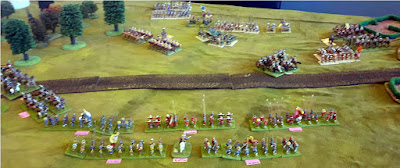With our new enlarged selection of troops, thanks to James collection of ECW troops appearing, we were able to tackle a refight of a largish battle from the war, certainly larger than the West Country campaigns usually featured.
Cheriton saw an outnumbered force of Royalists under Lords Forth and Hopton try to take the initiative against Waller's Parliamentarians. You can find a full account of the battle all over the web, with the
Wikipedia article being as good a place to start as any.
 |
| Opening Dispositions; Parliament to the Right, Cheriton wood at the top |
I translated the forces into 7 Royalist Regiments, one solely of muskets facing the wood, versus 8 Parliamentarian, with two Musket armed regiments initially in Cheriton wood. Cavalry was 4 troops to 5 respectively, with Parliament featuring a small force of Cuirassiers. Finally the Royalists had three guns, arranged close to the woods, whilst Waller fields four, on the open ground. The initial set up reflected the situation as Waller pushed substantial musketmen from the London Bands in to seize Cheriton wood; a maneouver Hopton anticipated with his artillery and own musketeers.
 |
| From the Royalist positions |
Myself and Gav took the royalists against James' Parliament. Initially it was all the Royalists favour, with the initial attack out of Cheriton wood stalled and a more general advance accross the field.
 |
| Royalist advances |
A protracted firefight would develop in the wood with Hoptons men slowly pushing back the Trained Bands over the course of the game. In the centre, Waller used his cavalry to try and punch through the Royalist left, whilst the Royalist cavalry on its' right attempted to clear the fields.
 |
| Mid battle |
Extracting the Parliament foot from the fields was a slow business, and resulted in a cavalry clash on the Cheriton road.
 |
| Close combat |
In this the Parliamentarians had the better of matters, and whilst the Royalist Left was ascendant, it was slowed by terrain, and at the same time its right was falling apart.
 |
| Conclusion |
With time against us, broken forces on the field would imply a defeat for the Royalists, but in operational terms it was probably more of a draw, or a stalemate. The Parliament infantry proved reluctant to advance despite its' units being factored slightly stronger individually, and in numbers over their opponents. However with markedly reduced cavalry numbers, Hopton could no longer cover his flanks, and so his advance in the open ground had stalled.
A good fun game.
...


























